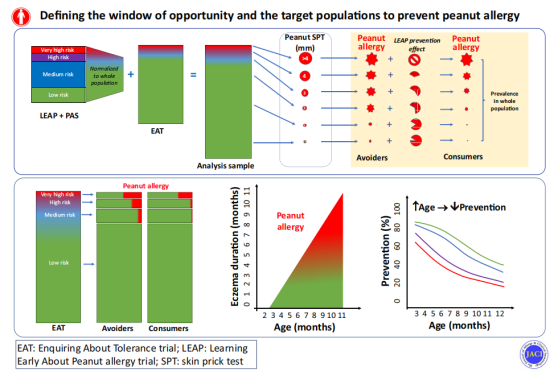Release date:2023-06-01

JACI
[IF:14.29]
Defining the window of opportunity and target populations to prevent peanut allergyDOI: 10.1016/j.jaci.2022.09.042
Abstract:
Background: Peanut allergy affects 1% to 2% of European children. Early introduction of peanut into the diet reduces allergy in high-risk infants.
Objectives: We aimed to determine the optimal target populations and timing of introduction of peanut products to prevent peanut allergy in the general population.
Methods: Data from the Enquiring About Tolerance (EAT; n 5 1303; normal risk; 3-year follow-up; ISRCTN14254740) and Learning Early About Peanut Allergy study (LEAP; n 5 640; high risk; 5-year follow-up; NCT00329784) randomized controlled trials plus the Peanut Allergy Sensitization (PAS; n 5 194; low and very high risk; 5-year follow-up) observational study were used to model the intervention in a general population. Peanut allergy was defined by blinded peanut challenge or diagnostic skin prick test result.
Results: Targeting only the highest-risk infants with severe eczema reduced the population disease burden by only 4.6%. Greatest reductions in peanut allergy were seen when the intervention was targeted only to the larger but lower-risk groups. A 77% reduction in peanut allergy was estimated when peanut was introduced to the diet of all infants, at 4 months with eczema, and at 6 months without eczema. The estimated reduction in peanut allergy diminished with every month of delayed introduction. If introduction was delayed to 12 months, peanut allergy was only reduced by 33%.
Conclusions: The preventive benefit of early introduction of peanut products into the diet decreases as age at introduction increases. In countries where peanut allergy is a public health concern, health care professionals should help parents introduce peanut products into their infants’ diet at 4 to 6 months of life.
First Author:
Graham Roberts
Correspondence Author:
Gideon Lack
Correspondence:
Children’s Allergy Service, 2nd Floor, Stairwell B, South Wing, Guy’s and St Thomas’ NHS Foundation Trust, Westminster Bridge Rd, London SE1 7EH, United Kingdom.
E-mail: gideon.lack@kcl.ac.uk.
 杭州浙大迪迅生物基因工程有限公司
杭州浙大迪迅生物基因工程有限公司
